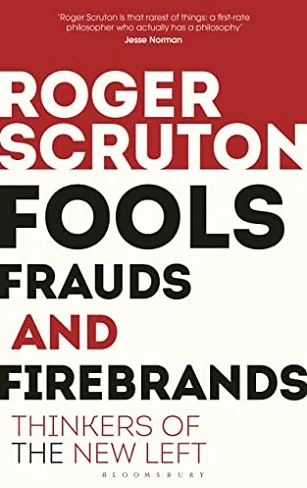| Title | Fools, Frauds and Firebrands |
| Author | Roger Scruton |
| Publisher | Bloomsbury Continuum |
| Year | 2019 |
| Pages | 304 |
| Rating | ★★★★★ |
| Purchase Link | Buy Here |
In an age when polarization and ideology seem to rule public discourse, Roger Scruton’s “Fools, Frauds and Militants” offers a critical lens through which to examine the currents that shape our society.
Through his insightful analysis, Scruton challenges preconceived notions and presents a compelling case for preserving tradition and culture. You can check book summaries clicking here.
Synopsis of Fools, Frauds and Firebrands
The book is a scathing critique of modern thought and an appeal to reason, respect and preservation of traditional culture.
“Fools, Frauders and Militants” is a dense and reflective work that explores the intellectual and moral flaws of what Scruton calls the ‘culture of falsehood’. This culture, in the author’s view, is driven by intellectuals who, without having a real understanding of the ideas they promote, end up sowing discord and disorder in society.
Scruton argues that this culture has a pernicious impact on the fabric of society, eroding tradition, social order, and individual freedom. You can buy Fool, Frauds and Firebrands clicking here.
Who was Roger Scruton?
Roger Scruton was one of the most prominent and influential conservative philosophers of the 20th and 21st centuries.
Born in England in 1944, Scruton dedicated his life to the study of philosophy, politics and aesthetics. He has been a professor at several renowned institutions, including the University of Oxford and the University of St. Andrews. Scruton was known for his conservative views and his defense of cultural tradition and individualism.
He has written extensively on a variety of topics, from beauty and architecture to politics and religion. Scruton passed away in 2020, but his legacy continues to influence and provoke debate in philosophy and politics. You can check a summary on ‘Conservatism: an Invitation to the Great Tradition’ here.
Summary of Fools, Frauds and Firebrands
In “Fools, Fraudsters, and Firebrands,” Scruton dives into a detailed analysis of today’s intellectual and political culture.
Scruton divides these actors into three categories: Fools, who are guided by emotion rather than reason; Frauds, who intentionally promote falsehoods to gain power; and the Militant, who seek to impose their views through force and intimidation. He argues that these three groups, though different in their approaches, share a contempt for tradition, social order, and individual liberty.
The book argues that contemporary society is being eroded by a culture of falsehood, in which intellectuals and activists promote ideas they do not fully understand, with harmful consequences for society.
They reject the cultural legacy they have inherited, seeking to reshape it according to their own ideological visions. You can buy Fool, Frauds and Firebrands clicking here.
Review of Fools, Frauds and Firebrands
“Fools, Frauds and Firebrands” is a provocative and pertinent work that challenges modern conventions.
Scruton does not shy away from controversial topics and presents his arguments clearly and bluntly. He tackles complex issues with keen insight, dissecting the flaws in logic and morality he sees permeating contemporary culture. The book is worth reading!
Scruton presents a scathing critique of contemporary thought, challenging readers to critically examine the ideas that are promoted in society.
However, “Fools, Frauds and Militants” is not just a criticism. It is also an appeal to reason, respect and preservation of culture and tradition.
Scruton argues that it is essential to value and protect the cultural legacy we inherit, rather than discarding it in favor of misunderstood modern ideologies. You can buy Fool, Frauds and Firebrands clicking here.
9 Key Lessons of Fools, Frauds and Firebrands
1. The Importance of Tradition: Scruton argues that tradition is essential to society and must be preserved.
2. The Culture of Falsehood Critique: Scruton criticizes the modern tendency to promote ideas without fully understanding them.
3. The Danger of Emotional Thinking: Scruton warns against being guided by emotion rather than reason.
4. The critique of militant activism: Scruton argues that imposing views through force is harmful to society.
5. The Value of Individual Freedom: Scruton advocates the importance of individual freedom in society.
6. The critique of cultural legacy rejection: Scruton criticizes the tendency to reject cultural legacy in favor of new ideologies.
7. The Danger of Intellectual Manipulation: Scruton warns against the danger of being manipulated by intellectual falsehoods.
8. The importance of reason: Scruton defends the importance of reason in public discourse.
9. The value of social order: Scruton argues that social order is essential to the well-being of society.
Negative points of Fools, Frauds and Firebrands
Every book has flaws, and this one is no different. See some reviews.
“Fools, Frauds and Militants” is a dense work and, at times, can be challenging for readers. Scruton’s writing style, while clear, may be considered by some to be too direct and, in some cases, even provocative.
However, the book is worth reading. This does not prevent the work from being worth reading.
Positive Points of Fools, Frauds and Firebrands
“Fools, Frauds and Militants” is a work of great intellectual depth and provides an insightful analysis of contemporary culture.
Scruton presents his arguments clearly and convincingly, challenging the reader to critically examine the ideas that are promoted in society. The book is well written and uses clear and accessible language. Scruton tackles complex topics with a clarity that makes it easy to understand.
In addition, the work is full of cultural and historical references that enrich the reading and provide a broader view of the context in which the ideas are formulated. Click to read a summary about How to be a Conservative by the same author.
Is it worth reading Fools, Frauds and Firebrands?
Even if you don’t agree with all of its positions, the book offers a valuable opportunity to understand a different perspective and reflect on the ideas that shape our society.
If you are interested in a critical analysis of contemporary culture and a conservative perspective on society, “Fools, Frauders and Militants” is essential reading. Scruton offers a unique and provocative vision that challenges preconceived notions and encourages reflection. It’s worth reading!
It is worth checking out the work and studying its arguments. You can buy Fool, Frauds and Firebrands clicking here.
Questions about Fools, Cheaters and Firebrands
Here are some questions people ask about this book.
What does it mean to be a militant person?
To be a militant person is to be actively involved and committed to a cause, usually political, social or economic.
What does militant character mean?
Militant character indicates an active, passionate and committed involvement with a cause or movement.
What is the meaning of the word militating?
“Militant” refers to the act of actively participating in or fighting for a cause, usually political or social in nature.
What is being a militant on the internet?
To be an internet activist is to use online platforms to advocate and fight for a cause or movement.
What is the synonym of militancy?
Synonyms of militancy include activism, engagement, struggle, and campaigning.
What is the difference between a militant and an activist?
Militants are often more aggressive or combative in their tactics than activists. However, the difference can be subtle and depends on the context.
What is the origin of the word militant?
The word “militant” comes from the Latin “militans”, which means “fighting, warring”, from the verb “militare” which means “to serve as a soldier”.
What is the origin of the word militancy?
The word “militancy” comes from the Latin “militantia”, which means “military service”. The modern connotation of fighting for a cause comes from use in political and social contexts.
What does the word fight the good fight mean?
This phrase appears to be a direct translation and may not have a clear meaning in English. The “good fight” could refer to a fair fight or a noble effort.
What does military slang mean?
“Militant” in modern slang usually refers to having actively fought for or championed a cause or opinion.
What is military on Twitter?
Military on Twitter is using the platform to actively advocate and promote a cause or movement.
Is it a miscreant or a militant?
“Miscreant” and “militant” are different words. “Miscreant” refers to a person who performs illegal acts. “Militant” is someone actively engaged in a cause.
How to spell militant?
“Militant” is the correct spelling for the word that describes someone actively engaged in a cause.
What is a political activist?
A political activist is someone who works to promote, prevent or influence political change.
How can I be an activist?
To be an activist, you can engage with issues that are important to you, join protests, campaigns or advocacy groups, and use platforms to raise awareness.
Who are the young activists?
Young activists include Greta Thunberg (climate), Malala Yousafzai (girls’ education), and Emma González (gun control).
Who militates verse?
The question is not clear. Are you referring to people who use Bible verses to support a cause? If so, it can vary widely.
Where is he who fights written?
The phrase “he who fights” is biblical and appears in several versions of the New Testament, most notably in 2 Timothy 2:4.

